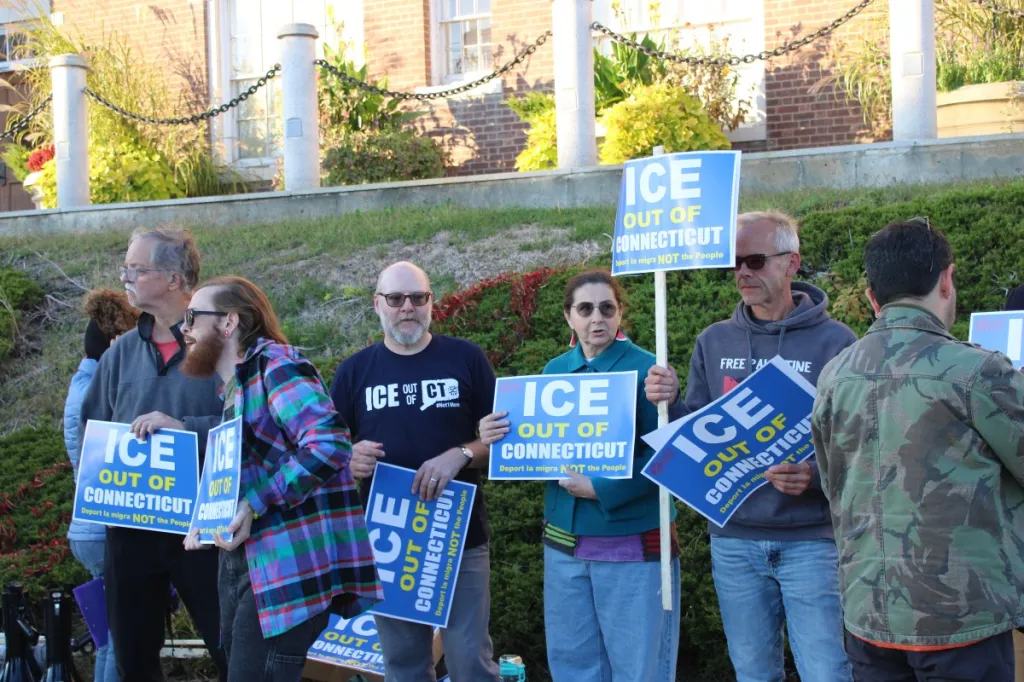Copyright Hartford Courant

With the prospect of increased federal immigration enforcement, towns and cities across Connecticut have been adopting guidelines for how their police departments and municipal employees should interact with the federal ICE agents. But as detentions increase, some citizens are calling for their towns to do more. Several Connecticut towns, including Bridgeport, New Haven, Hamden and Middletown, have approved or are discussing a variety of protocols, including prohibiting municipal employees from sharing residents’ data with ICE, requesting local police officers to ask ICE to remove their masks, and affirming the town’s commitment to follow the state’s law around immigration enforcement, known as the Trust Act. Connecticut’s Trust Act prohibits local and state law enforcement from arresting someone solely on the basis of a detainer — a request from ICE that police hold a person for up to 48 hours so federal agents can pick them up. Immigration advocates upset public not notified ahead of CT ICE raid; police explain why There are some exceptions, such as when ICE presents a judicial warrant, if the person is on a terrorist watch list or if the person in their custody has been convicted or pleaded guilty to a class A or B felony — crimes like murder, sexual assault, kidnapping, robbery and first-degree manslaughter. The Trust Act was the subject of intense debate in the state legislature last year, and an amended version of the law was eventually passed that expanded the list of crimes for which police officers could hand someone over to ICE and opened an avenue for people to sue cities and towns that cooperated with ICE in violation of state law. But in the wake of high-profile detentions by ICE, including enforcement activities in the courthouse in Stamford, in downtown Danbury and at a car wash in Newington, advocates have been calling on state lawmakers to further limit federal officials’ ability to access information or enter certain facilities. In September, 92 organizations wrote a letter to Gov. Ned Lamont asking that the state limit the amount of personal data shared between state agencies and the federal government, prohibit ICE from making arrests at courthouses and continue to offer state health insurance to unauthorized migrant children and pregnant women. The group Good Trouble Norwalk, a local chapter of the larger Indivisible organization, penned a second letter to Lamont on Oct. 9, and Indivisible Stamford wrote a third letter dated Oct. 22. In a letter dated Oct. 28 and addressed to immigrant advocates, Lamont wrote that his administration “stands firmly with our immigrant communities.” He said that while immigration enforcement is controlled by the federal government, the state would do everything legally possible to “uphold due process, protect privacy, and preserve trust between communities and local government.” “My administration is actively reviewing reports of destabilizing enforcement actions in several municipalities and working together with the judicial branch, legislators, and local leaders to ensure that state and local resources are focused on enforcing Connecticut law and upholding Connecticut values,” Lamont wrote. “We are also evaluating your recommendations regarding courthouse safety, data privacy, and health care coverage as part of our ongoing policy discussions with the General Assembly and relevant agencies.” In the meantime, some local municipalities are attempting to strengthen protection for immigrants on their own. At a Legislative Council meeting in Hamden on Wednesday, citizens who spoke to the council members criticized the Hamden Police Department for its response to a raid on the local Optimo Car Wash on Oct. 15, when eight people were detained by ICE. According to a statement from Hamden Police Lieutenant Robert Manfield, Homeland Security Investigations had informed a dispatcher in advance that they would be conducting an “enforcement action” that morning on Dixwell Avenue — although the agent did not give an exact location. Manfield noted that the agent who contacted the dispatcher hadn’t mentioned Immigrations and Customs Enforcement. “The Hamden Police Department complied with the State of Connecticut’s Trust Act. Hamden Police Officers were neither present nor involved in the event. The Hamden Police Department was not provided with details or specifics of the operation until after the event had taken place,” said Manfield. But some residents and advocates from nearby towns said that the police department’s actions violated the town’s “Welcoming City Ordinance,” which the town passed in April. Hamden resident Jennifer Paloma Rafferty told the council on Tuesday that she remembered her feelings when the ordinance passed. “I left feeling hopeful that Hamden was ready to stand up for its immigrant neighbors and become truly a welcoming community. But what we witnessed last Wednesday at the car wash on Dixwell Avenue broke that hope for me,” she said. “Families were torn apart. People who came here simply to work and build a better life were met instead with fear and violence. That’s not what a welcoming city looks like.” The “Welcoming City Ordinance” says that police officers should not ask residents about their immigration status and that they will not arrest anyone based on a civil detainer. It also prohibits town employees and people who work in the public schools from cooperating with ICE. Hamden Mayor Lauren Garrett told CT Mirror that the ordinance was meant to apply the Trust Act to all municipal employees in Hamden. “ I think that it brings attention for our employees in the town to understand that we are also committed to this,” said Garrett. Garrett said municipal employees had been instructed to go to a supervisor if they come into contact with federal immigration authorities. “ They should not answer any questions. They should not hinder any investigation, but they should ask a supervisor to get involved. I think it’s really important that the people who have more responsibility and authority handle the situation,” said Garrett. Garrett said she does not believe that the dispatcher violated the Welcoming City Ordinance, since the ordinance simply says not to cooperate with federal immigration authorities, and does not give explicit instructions about what to do if someone receives information regarding federal immigration activity in town. Advocates, on the other hand, said that they wanted Hamden police, if notified about immigration activity in town, to inform community groups about the action. But New Haven Mayor Justin Elicker told CT Mirror that if local police officers were to share advance information about the actions of federal immigration authorities with the general public, those officers could be charged with obstructing justice. “ We are not allowed, if we are notified by federal law enforcement, that they’re conducting a raid, to notify the public, and it will put our employees at risk,” said Elicker. The incident is currently the subject of an internal investigation within the Hamden Police Department. At the Hamden Legislative Council meeting on Tuesday, Councilwoman Sarah Gallagher said she had drafted a policy order saying employees who are informed about federal immigration activity would be required to bring that information to the mayor and the legislative council. She said she had also drafted a letter to Lamont and Attorney General William Tong asking them to make every effort to have the people detained at the car wash returned to the community. She said the letter also requested that the state impose a ban on ICE agents wearing masks and allow towns to require ICE agents to register with the town and limit the agency’s access to certain places in town. Legislative Council President Dominique Baez told CT Mirror that the policy order drafted by Gallagher would have to be viewed by different town departments and the town administrators before it could come to the council for a vote. Baez said the reason the council had created the original Welcoming City Ordinance was to make residents feel comfortable but also to ensure that the town would not use its already limited resources to assist federal immigration enforcement efforts. “We’re saying to our residents, ‘We want you here. We need you here. You’re welcome here. We want you to be safe here,’” Baez said. New Haven Hamden isn’t the first city to expand the Trust Act to include municipal employees. In New Haven, Elicker signed a Welcoming City Executive Order in July 2020. Under the order, city employees are forbidden to inquire about a person’s immigration status or to divulge certain types of “confidential information,” including someone’s immigration status, sexual orientation or status as a victim. Elicker said the executive order was drafted to make sure that residents weren’t afraid of interacting with city departments. He noted that the original purpose of the Trust Act was to make sure that witnesses and crime victims felt comfortable going to the police with information. “ That trust has enabled us to make sure that we keep our community safer. But there are many other departments that work with people in the community, and we need to make sure that community members also feel safe accessing other city services,” Elicker said. Employees who divulge confidential information can face disciplinary action. In fact, Elicker said, the city opened an investigation into an employee in the city’s Department of Vital Statistics who was sharing information with a federal employee. According to Elicker, the employee resigned. Bridgeport On Oct. 20, Bridgeport’s Public Safety and Transportation Committee voted in favor of a resolution that would limit ICE agents from accessing city surveillance cameras, traffic cameras or license plate readers. It would also block the city from working with vendors that allow federal immigration agents to access city data. Councilman Jorge Cruz Sr, who authored the original resolution, told CT Mirror that he drafted the resolution after feeling “helpless” when he watched the news. “I feel that these people are terrorizing the community, terrorizing people, breaking families apart,” said Cruz. Sonia Hernandez, a Bridgeport resident and member of the immigrant advocacy organization Make the Road CT, said the resolution allowed people without legal status to feel safe while moving around the city. Hernandez said having a resolution was critical for immigrants without legal status to feel safe in the community and trust local officials. Cruz said he was aware of 12 people who had been detained by ICE in Bridgeport between Jan. 20 and mid-June; Hernandez said she knew of 25 people who had been detained in the city since President Donald Trump took office in January. Of those people, she said, none had criminal records and five had already been deported. Hernandez said one of the key provisions in the resolution had to do with transparency — according to the resolution, the Bridgeport Police Department is asked to disclose monthly any requests they receive from federal immigration authorities. For Hernandez, who said she is undocumented and has been in the U.S. for 23 years, the immigration enforcement actions across the state and the country have brought back bad memories of the first presidential administration of Donald Trump, when she said she was almost deported. She’s particularly concerned for her children — ages 20, 16 and 11. “I don’t know how to answer when they ask, ‘Mom, are you back [at] risk?’” she said. The resolution is scheduled to be discussed with the full Council on November 2. Middletown In Middletown, residents have asked the Common Council to adopt a resolution affirming the city’s commitment to the Trust Act and requesting that ICE agents remove their masks and identify themselves when conducting enforcement operations in the city. The resolution was discussed at a meeting of the town’s Public Safety Committee in August. Councilman Darnell Ford, who chairs the Public Safety Committee, told CT Mirror that the immigration enforcement actions were making local residents worried that there are “no boundaries” to what federal agents could do. He said that residents were concerned that people being detained by ICE were not being offered due process, and that it was possible for people posing as federal immigration agents to kidnap people. Police Chief Eric Costa said that police departments cannot require ICE agents to remove their masks, although they can request that they do so. Costa said the CT Police Chiefs Association had met with Immigration and Customs Enforcement a few weeks ago and said the agency was open to listening to the police chiefs’ concerns about ICE agents wearing masks and the need for detainers signed by a judge. “We’re trying to work with everyone. We want to be the best representation of our city,” Costa said. Costa and Ford said they were aware of several enforcement actions in Middletown outside the Superior Courthouse. Costa said the Middletown Police Department had not been notified in advance about these incidents. Emilia Otte is a reporter for the Connecticut Mirror. Copyright 2025 @ CT Mirror (ctmirror.org).



